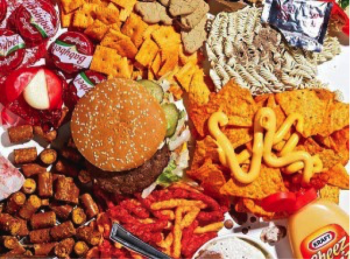
Ultra-Processed: The Sweet, Sad Truth About The American Diet
- Clean these foods out of your pantry!
- Sugar, sugar everywhere, but not a nutrient in sight
- The American diet: overfed and undernourished.
Dear Reader,
What did you have for breakfast?
There’s a good chance you may have taken a bite out of a once-frozen waffle or spooned down some cereal as you got your morning started — well, if you ate your breakfast in America, that is.
In fact, it’s more like a great chance.
New evidence taken from America’s largest health survey, the National Health and Nutrition Examination Survey (NHANES), finds that Americans are getting a staggering amount of their calories from ultra-processed food sources.
But the bad news just keeps coming from this study.
As it turns out, all of this ultra-processed food is responsible for almost the entire amount of the additional sugar that clogs up the American dietscape. And it’s making our country unhealthy.
Today, we will provide you some examples of what these foods are and what they can do to your body.
First, let’s break down the study.
![]() Ultra-gross
Ultra-gross
The study, from the University of São Paulo and Tufts University, was published in BMJ Open last week.
Data taken from the NHANES let researches examine the dietary habits of over 9,000 people.
After analyzing this information, they discovered 58 percent of the participants’ diets consisted of ultra-processed foods.
In addition, they found that 30 percent of the participants’ calories were coming from minimally processed foods. Processed but not ultra-processed foods made up 9.4 percent. Lastly, 3 percent consisted of “processed culinary ingredients,” like salt, oils, and sugar.
“Processed” foods are different from “ultra-processed foods.”
Let’s break it down…
Per the FDA, a food is “fresh” when it’s been recently harvested. However, I should mention, the FDA also allows foods that have been drenched in pesticides and coated in preservatives to be called “fresh.”
Minimually processed foods are things like frozen vegetables, pastas, eggs, and some meats.
Processed foods include items such as canned foods, cheese, breads, and even wine.
However, for the purposes of this study, the researchers were concerned with foods that are ultra-processed.
They define them as:
Formulations of several ingredients which, besides salt, sugar, oils, and fats, include food substances not used in culinary preparations, in particular, flavors, colors, sweeteners, emulsifiers, and other additives used to imitate sensorial qualities of unprocessed or minimally processed foods and their culinary preparations or to disguise undesirable qualities of the final product.1
Yum.
They also include examples: “Ultra-processed foods include mass-produced soft drinks; sweet or savory packaged snacks; confectionery and desserts; packaged baked goods; chicken/fish nuggets and other reconstituted meat products; instant noodles and soups.” 1

The building blocks of many Americans.
Photo credit: middleagemusclegain.com
But it’s these ultra-processed foods that are accounting for just about all of massive amounts of sugars we are eating — 90 percent, to be exact.
![]() Sickeningly Sweet
Sickeningly Sweet
The study found that one of every five calories in the average ultra-processed food product is due to sugar.
The 2015–2020 U.S. Dietary Guidelines and the World Health Organization both recommend that added sugars make up 10 percent or less of your daily caloric intake.
Only people who ate within the lowest 20 percent of the ultra-processed food range were in the 10 percent range for their average daily added sugar intake.
The 80 percent of those who ate the most ultra-processed foods blew right past the 10 percent limit.
As you may already know, added sugars can cause many health issues, including diabetes, obesity, tooth decay, risk of heart disease, and cancer.2
They suggest one of the main issues with the American diet is that sugar-laden, ultra-processed foods are replacing “more-nutrient-dense foods.” Because of this, Americans are “simultaneously overfed and undernourished.” 2
In conclusion of the study, the researchers suggest the obvious: The best way for you to cut out this added sugar is to reduce your intake of ultra-processed foods.
If you have any special ways to avoid processed foods you would like to share, please do!
Nmoore@lfb.org
Live well,

Natalie Moore
Managing editor, Living Well Daily
Sources
[1] ‘Ultra-processed’ foods make up more than half of all calories in US diet
Written By Natalie Moore
Natalie Moore is a dedicated health researcher with a passion for finding healthy, natural, and science-based solutions. After a decade of direct healthcare experience in western and natural medicine, she was involved in public health research before joining Living Well Daily.
View More Free Articles
Weird Tea Trick Calms Your Mind While Boosting Focus
You know the drill… If you want to feel more alert, coffee gives you the jolt you need. But when it’s calm that you seek, chamomile tea soothes you to sleep. But what if you could drink a beverage that can do both at the same time? A natural compound found in certain teas offers...
Can't Shake Negative Thoughts? Check Your GUT First
Everyone struggles sometimes to stay positive or see the bright side of things. It’s part of being human. You might think those negative thoughts start in your brain—but it’s more complicated than that. A simple change to your daily habit can help dial down those negative feelings. New research suggests that this simple strategy could...
Repair Your Gut Barrier With the “Sunshine Cure”
Happy Fourth of July! As you celebrate with sunshine, good food, and great company, don’t forget—those summer rays aren’t just lifting your spirits… they’re also working behind the scenes to protect your gut and boost your health. Your gut health is more important than most people realize. It directly affects your overall well-being—from immunity to...
The 5 Health Numbers Your Doctor Wishes You'd Track
Have you ever been told you should “advocate” for yourself when it comes to your healthcare and wondered what that really means? It’s not just a buzzword—it’s a powerful concept that empowers you to take charge of your own health journey. In fact, it could save your life. Being your own best health advocate starts...
Do THIS Every 20 Minutes to STOP Digital Eye Strain
Our eyes are under assault—they are the true victims of our current digital age. And it’s because we are constantly glued to screens… phones, tablets, computers, TVs—you name it. Unfortunately, that screen time is taking a serious toll. Digital eye strain affects millions worldwide. In fact, up to 50 percent of computer users could develop...
Mailbag: The Calcium Mistake That's Hardening Your Arteries
“What type of calcium is best to take with bisphosphonates for osteoporosis? I know some varieties can build up in arteries. Thanks for the help.” —Bone Builder Hi Builder, When a patient asks me about calcium, I ask them a peculiar question in return… “Ever wonder how elephants and giraffes build and maintain their massive...
Doctor-Approved Method to Ditch Blood Pressure Meds
In a world where drug solutions dominate healthcare, it’s refreshing to discover that best remedies sometimes don’t involve a single pill. A groundbreaking study shows simple relaxation techniques could be your secret weapon against one of America’s deadliest health conditions. Best of all? It’s free, easy to start right away—and your results are bound to...
Trouble Hearing? Your Heart Could Be at Risk
With research exploding and data pouring in, scientists are uncovering some weird (and surprisingly helpful) health connections. Today’s odd couple? Hearing loss and heart failure. Turns out your ears and your ticker are more connected than you ever imagined. A major study published in the journal Heart looked at over 164,000 people for nearly a...
Stay Up Late? It Could Destroy Your Mental Health
If you dread mornings but come alive at night, there’s concerning new research you need to know about. A recent study found that “night owls” are at higher risk for depression. But before you rush to set your alarm to get up with the sun tomorrow, there’s more to the story… Chronotypes are essentially your...
Go from Flabby to Fit with this Common Vitamin
If you’re like many of us, you woke up one day, looked in the mirror, and realized you’re no spring chicken anymore. Even worse—when you weren’t paying attention—it seems you somehow misplaced the muscles of your youth and have gone from fit to flabby. Aging has a way of humbling us like that. But scientists...









